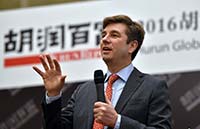

As a way of easing the ever-growing pressure of its yawning pension gap, China should start to gradually extend the current retirement age of employees. For example, it can extend the retirement age of men by four years and women by nine years. The measure will help reduce the country's pension shortage in the future, although it cannot offer a once-and-for-all solution.
China should also allocate part of the government-held shares of listed State-owned enterprises to the national social security network to enable the dividends and interests they yield to become an important source of social security payment. This, together with a longer working age, will fill the pension gap for urban residents in the future.
Considering some practical difficulties in using SOEs' shares as national social security fund, the government can take experimental measures in the coming years. For example, it can first use about 20-30 percent of its SOEs' shares, which would be about 3 trillion yuan ($481.56 billion), as national social security fund within two or three years and then gradually expand the scale after gathering some experience from the process.
Besides, it should establish a long-term nursing insurance system to ease the fiscal pressure in this field. Experiences of the US, Germany, Japan and the Republic of Korea show that the establishment of a commercial nursing insurance system can help mitigate a country's long-term nursing expenses, which now are a heavy fiscal burden both on households and the government.
The government should also take practical measures to accelerate the opening of the country's capital accounts and push forward the internationalization of the yuan.
China's current foreign assets are mainly dominated by foreign reserves, with a low return ratio, which is about 2 percent. In contrast, as a major form of China's national debt, inbound foreign direct investments usually yield 10 percent returns. To change such asymmetrical return ratio between its foreign assets and debts, the government should lower the share of foreign reserves in its foreign assets and raise the ratio of non-governmental investment by a large margin.
As a precondition to expanding outbound non-government investment, it has to first open its capital accounts. The country's foreign assets, at present, are mainly in dollar and euro denominations, which could pose a huge risk to its foreign assets in times of drastic fluctuations of the two currencies.
To reduce such a risk, China should try to keep some of its foreign assets in yuan. As a concrete move, the country should open its Panda bond market and allow foreign financial institutions to issue yuan bonds in the domestic inter-bank bond market and domestic investors to hold more yuan-denominated foreign assets.
The author is chief economist of Deutsche Bank Greater China and a researcher at Boyuan Foundation. The article is an excerpt from a speech he delivered recently.
(China Daily 12/12/2012 page9)
 Fun time for children at international toy expo in Beijing
Fun time for children at international toy expo in Beijing
 Huawei launches new smartphone P9 in Vietnam
Huawei launches new smartphone P9 in Vietnam
 Top 10 box office movies on China market in H1
Top 10 box office movies on China market in H1
 Woman resigned from high salary job to make notebooks
Woman resigned from high salary job to make notebooks
 Hurun publishes Global Chinese Big Philanthropy Report 2016
Hurun publishes Global Chinese Big Philanthropy Report 2016
 Top 10 new economy issues in China
Top 10 new economy issues in China
 Wetland helps preserve ecology of Dianchi Lake
Wetland helps preserve ecology of Dianchi Lake
 A million ways to beat the summer heat
A million ways to beat the summer heat

